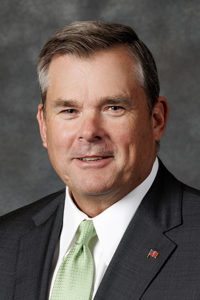Immediate deduction of equipment, R&D expenses advanced
Lawmakers gave first-round approval March 21 to a proposal intended to incentivize Nebraska businesses to invest in new equipment and technology after amending it to include several other tax-related bills.

The 2017 Tax Cuts and Jobs Act enacted by Congress allowed businesses to fully and immediately deduct expenses for certain business machinery and equipment, as well as research or experimental expenditures. Those two tax breaks have since expired, requiring businesses to deduct their expenditures over a period of several years.
LB1023, introduced by Elkhorn Sen. R. Brad von Gillern, would decouple Nebraska’s tax code from both federal provisions, reinstating the immediate deductions for state income tax purposes.
He said allowing business owners to fully deduct their expenses in the current year would free up money they could use to reinvest in their operations or hire new employees.
Von Gillern introduced an amendment, adopted 37-0, under which patrons of a cooperative corporation also could claim the deductions.
A Revenue Committee amendment, adopted 35-0, included the provisions of five other bills heard by the committee this session, including two that relate to income earned by nonresident individuals.
Under the amended provisions of LB173, sponsored by Sen. Eliot Bostar of Lincoln, and LB416, introduced by Omaha Sen. Kathleen Kauth, compensation paid to a nonresident individual would not constitute income derived from sources within Nebraska if:
• the compensation is paid to the individual while in the state to attend a work-related conference or training;
• the individual is present in Nebraska for seven or fewer workdays in the taxable year;
• the individual worked in more than one state during the taxable year; and
• total compensation while in Nebraska does not exceed $5,000 in the taxable year.
Additionally, compensation paid to a nonresident who serves on the board of directors of a business and that relates to the board’s activities in the state would not constitute Nebraska-derived income.
The provisions of LB1049, also sponsored by Bostar, would decrease the maximum occupation tax on receipts from the sale of telecommunications service from 6.25% to 4% beginning Oct. 1, 2024.
The amended provisions of LB1113, introduced by Sen. Fred Meyer of St. Paul, business equipment used primarily for the capture and compression of carbon dioxide would be eligible for a personal property tax exemption under the ImagiNE Nebraska Act.
Under amended provisions of LB1400, sponsored by Lincoln Sen. Beau Ballard on behalf of Gov. Jim Pillen, an employer that pays relocation expenses for a qualifying employee could apply to the state Department of Revenue for a refundable state income tax credit of up to $5,000.
The department could not grant a credit unless the employee is paid an annual salary of between $70,000 and $250,000. The department could approve a maximum of $5 million in credits under the program each year.
In addition to the employer credit, the employee would be eligible to make a one-time election to exclude their Nebraska-sourced income from state income tax for the taxable year.
The department could recapture the credit amount, and any reduction in tax as a result of the exclusion, if the employee does not maintain residency in Nebraska for two years.
LB1023 advanced to select file on a vote of 35-0.

